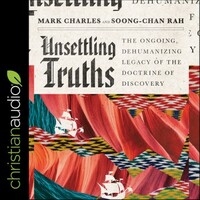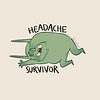Take a photo of a barcode or cover
95 reviews for:
Unsettling Truths: The Ongoing, Dehumanizing Legacy of the Doctrine of Discovery
Soong-Chan Rah, Mark Charles
95 reviews for:
Unsettling Truths: The Ongoing, Dehumanizing Legacy of the Doctrine of Discovery
Soong-Chan Rah, Mark Charles
Accessible and useful in this conversation and tasks. Written from a Christian and Indigenous perspective.
challenging
emotional
informative
reflective
medium-paced
Important for people to know and the Christian right colonizer apologists really should read. But if you already know manifest destiny is bullshit —> well it’s a lot A LOT of biblical proof of that. So could prob be useful if you need b biblical reasons why it’s wrong to argue with them.
Interesting reading...
This is a good reading. It analyses the birth of the Doctrine of Discovery, based on the Papal Bulls of the late 1400s, how the others moved from the Saracens to everyone but White Christian Europeans, and how it came to the USA. Looks at its base on Christian Imperialism - Christiandom - starting the IV Century.
it.
The book used two terms, one is diseased social imagination and the other is heresy of empire. Former is how the construction of society (externalization -> institutionalization -> internalization) builds Supremacy as status quo impossible to challenge; the later is religion as the justification for imperial aspirations, American Exceptionalism, Manifest Destiny, Just war (regardless of what it truly what it is), etc.
Both authors are Evangelical Native Americans, which on one hand gives them a unique perspective; it also means the book is spread with biblical references, particularly chapter three, and literal interpretation.
A very useful part is a counterpoint to the narrative used by Christian White Supremacists who use Biblical references to justify themselves. They do a really good job going almost point by point.
They indicate that in a reconciliation process the Christian Church can participate, cannot lead. Its involvement in the establishment of the American Christiandom, White Christian Supremacy, forbids it.
I find some of their conclusions, on perpetrator PTSD or the way they apply White Fragility, not very convincing; I believe I understand their argument and value on how they frame them.
As a UU (Secular) Humanist same goes for some of the religious based arguments. As said, I believe it is a good read and I recommend it; it gives new information, perspective and some tools to address the issue.
From the final chapters:
"The United States of America has a white majority that remembers a history of discovery, opportunity, expansion, and exceptionalism. Meanwhile our communities of color have the lived experiences of stolen lands, broken treaties, slavery, Jim Crow laws, Indian removal, ethnic cleansing, lynchings, boarding schools, segregation, internment camps, mass incarceration, and families separated at our borders. Our country does not have a common memory. "
[A discussion on gender, race, systemic discrimination, etc. and reparations is long overdue]
This is a good reading. It analyses the birth of the Doctrine of Discovery, based on the Papal Bulls of the late 1400s, how the others moved from the Saracens to everyone but White Christian Europeans, and how it came to the USA. Looks at its base on Christian Imperialism - Christiandom - starting the IV Century.
it.
The book used two terms, one is diseased social imagination and the other is heresy of empire. Former is how the construction of society (externalization -> institutionalization -> internalization) builds Supremacy as status quo impossible to challenge; the later is religion as the justification for imperial aspirations, American Exceptionalism, Manifest Destiny, Just war (regardless of what it truly what it is), etc.
Both authors are Evangelical Native Americans, which on one hand gives them a unique perspective; it also means the book is spread with biblical references, particularly chapter three, and literal interpretation.
A very useful part is a counterpoint to the narrative used by Christian White Supremacists who use Biblical references to justify themselves. They do a really good job going almost point by point.
They indicate that in a reconciliation process the Christian Church can participate, cannot lead. Its involvement in the establishment of the American Christiandom, White Christian Supremacy, forbids it.
I find some of their conclusions, on perpetrator PTSD or the way they apply White Fragility, not very convincing; I believe I understand their argument and value on how they frame them.
As a UU (Secular) Humanist same goes for some of the religious based arguments. As said, I believe it is a good read and I recommend it; it gives new information, perspective and some tools to address the issue.
From the final chapters:
"The United States of America has a white majority that remembers a history of discovery, opportunity, expansion, and exceptionalism. Meanwhile our communities of color have the lived experiences of stolen lands, broken treaties, slavery, Jim Crow laws, Indian removal, ethnic cleansing, lynchings, boarding schools, segregation, internment camps, mass incarceration, and families separated at our borders. Our country does not have a common memory. "
[A discussion on gender, race, systemic discrimination, etc. and reparations is long overdue]
I really enjoyed the parts detailing the Doctrine of Discovery and its surprisingly long legal legacy that continues to shape law and policy today. I also found the references to the Christian Reformed Church (CRC), a denomination to which I belong, to be particularly fascinating albeit horrifying at the same time. The discussion of Lincoln's complicity with Native American genocide via the Long Walk and Bosque Redondo sheds important light on an oft-overlooked piece of our nation's history. The book felt a little disjointed in places and thus was not as clear as I wish it had been: the content is important and solid, but the writing or editing could have been better. To be more specific, it felt as if the "Doctrine of Discovery" was the foundation of the book--which makes sense--and then the chapters in a seemingly arbitrary order addressed various aspects and legacies of that foundation. I would've appreciated a more chronological approach or a thematic one that made more sense to me.
informative
reflective
medium-paced
“You cannot discover lands already inhabited.”
America could span from sea to shining sea because it stole land through conquest and violence based on the Doctrine of Discovery - a papal document giving carte blanche to Columbus and Spain to seize land and enslave people in the name of “God” and spreading the “gospel.”This document set a precedent for other colonizing European nations as well as land grabs in my lifetime.
This book is a hard and necessary read because it lays out the history of the colonizers/settlers treatment of America’s indigenous peoples. History that needs to be owned and grieved. I don’t know if I will be able to read the Little House books after this because the reason the great outdoors seemed so empty for the taking was because of ethnic cleansing. But if we aren’t honest, what can the American church offer toward conciliation if we are lying to ourselves and our children? The authors also point out the inherited trauma of the peoples harmed in our history and, with great compassion, the inherited trauma of those who carried out the genocide. This makes me wonder if the myth of exceptionalism is a coping mechanism, denial on a national scale.
I listened to the audio version. At the end, the reader goes through a list of the nearly 700 tribes, some of which have been exterminated, probably all driven from their land. 700 groups of image bearers.
I think the appropriate response for this book is sitting with the discomfort and prayer - that God would soften our hearts and move us in line with his justice.
America could span from sea to shining sea because it stole land through conquest and violence based on the Doctrine of Discovery - a papal document giving carte blanche to Columbus and Spain to seize land and enslave people in the name of “God” and spreading the “gospel.”This document set a precedent for other colonizing European nations as well as land grabs in my lifetime.
This book is a hard and necessary read because it lays out the history of the colonizers/settlers treatment of America’s indigenous peoples. History that needs to be owned and grieved. I don’t know if I will be able to read the Little House books after this because the reason the great outdoors seemed so empty for the taking was because of ethnic cleansing. But if we aren’t honest, what can the American church offer toward conciliation if we are lying to ourselves and our children? The authors also point out the inherited trauma of the peoples harmed in our history and, with great compassion, the inherited trauma of those who carried out the genocide. This makes me wonder if the myth of exceptionalism is a coping mechanism, denial on a national scale.
I listened to the audio version. At the end, the reader goes through a list of the nearly 700 tribes, some of which have been exterminated, probably all driven from their land. 700 groups of image bearers.
I think the appropriate response for this book is sitting with the discomfort and prayer - that God would soften our hearts and move us in line with his justice.
This is an important, powerful book that traces the Church's quest for power from Constantine through the Doctrine of Discovery to the founding of the USA to today. An exhaustive illustration of how the American Church has been unable and unwilling to surrender its attachment to White Supremacist ideology. And running throughout, there's a hope that if the American church will listen to the voices we've pushed aside, it's not too late.
It’s important to understand what is so deeply ingrained throughout history in order to weed the problem out at the root. This book was incredibly helpful to see even these insidious thoughts in my own theology, and to come to terms with the sins of this nation and White evangelicalism.






